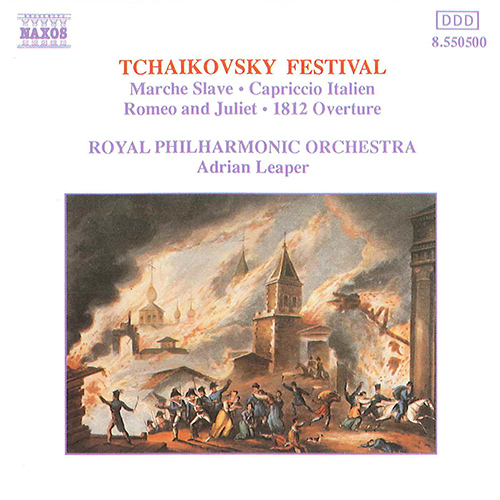TCHAIKOVSKY FESTIVAL
Tracklist
The Slovak Radio Symphony Orchestra (Bratislava), the oldest symphonic ensemble in Slovakia, was founded in 1929. The orchestra’s first conductor was Frantisek Dyk and over the past sixty years it has worked under the direction of several prominent Czech and Slovak conductors.
The orchestra has made many recordings for Naxos ranging from the ballet music of Tchaikovsky to more modern works by composers such as Copland, Britten and Prokofiev. For Marco Polo the orchestra has recorded works by Glazunov, Glière, Rubinstein and other late romantic composers and film music of Honegger, Ibert and Khatchaturian.

Adrian Leaper’s career began with a five-year tenure as assistant conductor of the Hallé Orchestra in Manchester. He was later principal conductor of the Gran Canaria Philharmonic for eight years and principal conductor and artistic director of the RTVE Symphony Orchestra in Madrid for nine years.
He has conducted orchestras all over the world and has recorded a series of Spanish music of the 20th century for ASV.
For more information, visit www.adrianleaper.com.

Gustav Holst, of Scandinavian ancestry on his father’s side, was born in the English spa town of Cheltenham in 1874 and studied music at the Royal College in London, using his second study, the trombone, to provide an income. He later became director of music at St Paul’s Girls’ School, retaining this connection until the end of his life. His music had a variable reception in his lifetime, but he exercised a strong influence on later English composers.
Stage Works
Holst wrote a number of works for the theatre, their subjects reflecting his varied interests, from Hindu mythology to Shakespeare and the medieval world of the Wandering Scholar. From his final chamber opera The Perfect Fool, first staged in 1923, with its parodies of Verdi and Wagner, comes a better-known ballet suite. The opera itself is seldom performed.
Vocal and Choral Music
As a choral conductor, Holst wrote a considerable amount of choral music, accompanied and unaccompanied, including arrangements of folksongs and a smaller number of solo songs.
Orchestral Music
By far the best known of all Holst’s compositions is The Planets, a sequence of seven movements, reflecting the composer’s interest in astrology and the generally attributed qualities of each. ‘Jupiter, The Bringer of Jollity’ provided the melody for a popular patriotic hymn, while ‘Mars, The Bringer of War’, suggests the period of the work’s composition: between 1914 and 1916. For string orchestra he wrote the St Paul’s Suite, completed in 1913, and in 1933 the Brook Green Suite. The two suites for military band were written in 1911. His Suite de ballet, Op. 10 was written in 1899 and revised in 1912.































